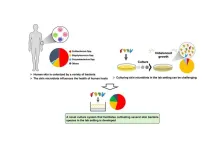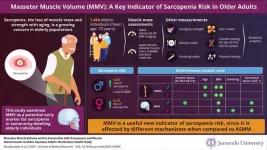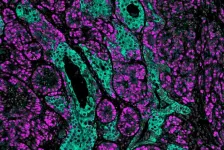An innovative antibiotic for drug-resistant bacteria
2024-11-20
(Press-News.org) Antibacterial drugs are important for treating infections. But increasingly, bacterial resistance to current drugs — so they don’t work well, or even at all — means new ones are urgently needed. Building on previous work, researchers in ACS Infectious Diseases have demonstrated a potential antibacterial treatment from a modified darobactin, a compound originally from a bacterium. The team reports proof-of-concept animal trials on infections caused by bacteria, including E. coli, that are known to develop drug resistance.
This study was published during the World Health Organization’s World Antimicrobial Resistance (AMR) Awareness Week from November 18 to 24.
Earlier in 2024, the World Health Organization updated its list of bacterial pathogens that can develop resistance to antibiotics to include Acinetobacter baumannii, Pseudomonas aeruginosa and E. coli, among others. Despite the need for new antibiotics that target these priority pathogens, scientists don’t have many candidates. One potential resistance-breaking compound is called darobactin, a naturally produced antibiotic discovered in a bacterium. Darobactin binds to an essential protein in cells of different bacteria and eventually causes their death. Previously, Rolf Müller, Jennifer Herrmann and colleagues showed that genetically engineered versions of darobactin have antibacterial activity. Specifically, one of these non-natural, biosynthetic darobactins (called D22) inhibited A. baumannii growth in lab assays.
For this new study, a larger team led by Müller and Herrmann tested the engineered D22 compound against several priority bacterial infections in animals. First, in zebrafish embryos, D22 treatment cleared A. baumannii infection as effectively as ciprofloxacin, a broad-spectrum antibiotic used for complicated infections. Then the team conducted a series of efficacy and dosing trials with mice:
Best delivery method: Observations indicated that administering D22 as an injection was more effective than via mouth.
Efficacy against P. aeruginosa: Repeated doses of D22 substantially limited P. aeruginosa bacterial growth in mice (thigh tissue infection) but didn’t fully clear the infection.
Multi-dose experiments against E. coli: Administering D22 four times in 25 hours fully cleared E. coli in a severe infection model of peritonitis (abdomen infection). Activity was also observed for single doses. Twice-daily D22 injections over three days significantly reduced bacterial presence in a complicated E. coli urinary tract infection, although not as low as the antibiotic gentamicin, which reduced bacterial loads below detection.
These results show that D22 can inhibit critical infections and highlights the compound’s promise for further development toward future clinical trials as “an innovative solution to fight antimicrobial resistance,” say the researchers.
The authors acknowledge funding from the Helmholtz Impuls- und Vernetzungsfonds (Impulse and Networking Fund).
Some of the authors are employees of Evotec, a biotechnology company involved in drug discovery and development.
The paper’s abstract will be available on Nov. 20 at 8 a.m. Eastern time here: http://pubs.acs.org/doi/abs/10.1021/acsinfecdis.4c00687
###
The American Chemical Society (ACS) is a nonprofit organization chartered by the U.S. Congress. ACS’ mission is to advance the broader chemistry enterprise and its practitioners for the benefit of Earth and all its people. The Society is a global leader in promoting excellence in science education and providing access to chemistry-related information and research through its multiple research solutions, peer-reviewed journals, scientific conferences, e-books and weekly news periodical Chemical & Engineering News. ACS journals are among the most cited, most trusted and most read within the scientific literature; however, ACS itself does not conduct chemical research. As a leader in scientific information solutions, its CAS division partners with global innovators to accelerate breakthroughs by curating, connecting and analyzing the world’s scientific knowledge. ACS’ main offices are in Washington, D.C., and Columbus, Ohio.
Registered journalists can subscribe to the ACS journalist news portal on EurekAlert! to access embargoed and public science press releases. For media inquiries, contact newsroom@acs.org.
Note: ACS does not conduct research but publishes and publicizes peer-reviewed scientific studies.
Follow us: X, formerly Twitter | Facebook | LinkedIn | Instagram
END
ELSE PRESS RELEASES FROM THIS DATE:
2024-11-20
Residential garden produce grown near the Fayetteville Works fluorochemical plant can expose those who consume it to per- and polyfluoroalkyl substances (PFAS), according to a new study conducted by researchers from North Carolina State University, East Carolina University and the Colorado School of Mines.
“It is often assumed that contaminated drinking water is the main pathway through which we are exposed to PFAS,” says Detlef Knappe, professor of civil, construction, and environmental engineering at NC State and a lead investigator of the study. “An important goal of our study was to determine whether people ...
2024-11-20
Carnegie Mellon University Africa announced today that it will expand its digital public infrastructure initiative across the continent. Called the Upanzi Network, this Africa-based collaboration of engineering research labs will work toward a secure and resilient digital transformation by focusing on innovation across the entire pipeline of open standard technologies for the public good.
The initiative was launched in 2021 with the creation of a research laboratory at CMU-Africa in Kigali, Rwanda. Since its launch, the laboratory has made progress in capacity building, knowledge transfer, and digital public infrastructure governance and deployment. It performs research in ...
2024-11-20
With most donated clothes exported or thrown away, experts are calling for a shakeup of how we deal with the growing fashion waste issue.
A first of its kind study, published in Nature Cities, analysed what happens to clothes and other textiles after consumers no longer want them in Amsterdam, Austin, Berlin, Geneva, Luxembourg, Manchester, Melbourne, Oslo and Toronto.
Across most western cities from Melbourne to Manchester it found the same pattern of textile waste being exported, going to landfill or being dumped in the environment.
Global textiles waste each year weighs 92 million tonnes and this could double by 2030.
Charity shops handle a large amount of used clothes, but the study ...
2024-11-20
The human skin is home to a wide variety of bacteria. The composition of the community of bacteria—called the “skin microbiota”—has serious implications for skin health. A healthy balance between different species of bacteria on the skin often translates to healthy skin. The loss of this balanced skin microbiota can lead to diseases such as atopic dermatitis, acne, and psoriasis. Since the skin microbiota can vary based on various factors such as age, sex, climate, and an individual’s ...
2024-11-20
As populations age, the prevalence of sarcopenia—a progressive loss of muscle mass and function—has become an increasingly urgent public health concern. Sarcopenia increases the risk of falls and frailty, reduces the quality of life for older adults, and heightens the likelihood of requiring long-term care. Preventing sarcopenia is, therefore, crucial for alleviating this healthcare burden.
A pioneering study conducted by researchers from Juntendo University in Japan sheds light ...
2024-11-20
An enzyme called EZH2 has an unexpected role in driving aggressive tumor growth in treatment-resistant prostate cancers, according to a new study by scientists at Weill Cornell Medicine. The results could potentially lead to new therapies for patients with limited options and add to the significant progress the teams have made in understanding how advanced prostate cancer develops resistance to treatments that target androgen receptors.
Prostate cancer is a leading cause of cancer-related death in men, claiming over 30,000 lives annually in the United States. While most prostate cancers initially respond ...
2024-11-20
CHICAGO – Nov. 20, 2024 – Northwestern Medicine, West Health, and the Meadows Mental Health Policy Institute have announced a new collaboration that will make accessing care to evidence-based mental health services faster and easier for primary care patients across Northwestern Medicine.
This $8.6 million multi-year initiative from West Health will establish the Northwestern Medicine West Health Accelerator, which will provide access to comprehensive psychiatric services for primary care practices throughout Northwestern Medicine, expanding access to mental health ...
2024-11-20
This research introduces a novel method for inferring DNA methylation patterns in non-skeletal tissues from ancient specimens, providing new insights into human evolution. As DNA methylation is a key marker of gene expression, this work allows scientists to explore changes in gene activity in the brain and other tissues that are typically absent from the fossil record. The team applied their method to the brain, offering a deeper understanding of the evolutionary processes that shaped human brain and neural functions. The findings ...
2024-11-20
A team of researchers at the University of California San Diego has developed a new and improved wearable ultrasound patch for continuous and noninvasive blood pressure monitoring. Their work marks a major milestone, as the device is the first wearable ultrasound blood pressure sensor to undergo rigorous and comprehensive clinical validation on over 100 patients.
The technology, published on Nov. 20 in Nature Biomedical Engineering, has the potential to improve the quality of cardiovascular health monitoring in the clinic ...
2024-11-20
Spin-out ChromaTwist has won a prestigious Innovate UK Smart grant to co-fund a £0.5m project. The funding from Innovate UK, the UK’s innovation agency, covers 70% of the cost of a project that will take ChromaTwist’s novel dyes to the next level in terms of enhanced brightness and staining indices, to make cells and cellular structures stand out more clearly during bio-imaging.
The funding also allows ChromaTwist, which is raising funds, to push on with technical development and prepare for scale-up and ...
LAST 30 PRESS RELEASES:
[Press-News.org] An innovative antibiotic for drug-resistant bacteria




